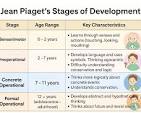
Exploring the Fascinating Journey of Cognitive Development in Children
The Development of Cognitive Skills in Children
As children grow and learn, their cognitive skills – the mental processes that help them think, understand, and remember information – also develop and mature. Understanding the stages of cognitive development can provide valuable insights into how children learn and interact with the world around them.
Sensorimotor Stage (0-2 years)
During the sensorimotor stage, infants and toddlers explore the world through their senses and actions. They learn about cause and effect, object permanence (understanding that objects continue to exist even when they are out of sight), and develop basic motor skills.
Preoperational Stage (2-7 years)
In the preoperational stage, children begin to use language to represent objects and ideas. Their thinking is still egocentric, meaning they struggle to see things from another person’s perspective. They also engage in symbolic play and develop a basic understanding of numbers and concepts like time.
Concrete Operational Stage (7-11 years)
During the concrete operational stage, children become more logical in their thinking. They can understand conservation (the idea that properties such as volume or number remain constant despite changes in appearance) and begin to solve problems systematically. Their ability to classify objects and understand relationships between them improves.
Formal Operational Stage (11+ years)
In the formal operational stage, adolescents develop abstract thinking skills. They can think about hypothetical situations, consider multiple perspectives, and engage in deductive reasoning. This stage marks a significant milestone in cognitive development as individuals become capable of more complex problem-solving.
It’s important to remember that every child is unique, and development may vary from one individual to another. By understanding the stages of cognitive development, parents, educators, and caregivers can support children’s learning experiences effectively and help them reach their full potential.
Five Essential Tips for Enhancing Cognitive Development
- Engage in regular mental exercises such as puzzles or crosswords to stimulate the brain.
- Maintain a healthy diet rich in fruits, vegetables, and omega-3 fatty acids to support cognitive function.
- Stay physically active as exercise has been shown to improve cognitive abilities.
- Get enough quality sleep each night as rest is essential for optimal brain function.
- Practice mindfulness and meditation to reduce stress levels and enhance focus and memory.
Engage in regular mental exercises such as puzzles or crosswords to stimulate the brain.
Engaging in regular mental exercises, such as solving puzzles or crosswords, is a fantastic way to stimulate the brain and enhance cognitive development. These activities challenge the mind, improve problem-solving skills, and boost memory retention. By incorporating such exercises into your routine, you not only keep your brain sharp and active but also promote overall mental well-being. So next time you’re looking for a fun and beneficial way to spend your time, grab a puzzle or crossword and give your brain a workout!
Maintain a healthy diet rich in fruits, vegetables, and omega-3 fatty acids to support cognitive function.
Ensuring a balanced and nutritious diet is essential for supporting cognitive function in children. By incorporating a variety of fruits, vegetables, and foods rich in omega-3 fatty acids into their meals, parents can provide the necessary nutrients to promote brain development and enhance cognitive abilities. Fruits and vegetables are packed with vitamins, minerals, and antioxidants that help protect brain cells and support overall brain health. Omega-3 fatty acids, found in foods like fish, nuts, and seeds, play a crucial role in cognitive function, memory retention, and concentration. By making healthy food choices, parents can positively impact their child’s cognitive development and set them up for success both academically and in everyday life.
Stay physically active as exercise has been shown to improve cognitive abilities.
Staying physically active is not only beneficial for our bodies but also plays a crucial role in enhancing cognitive abilities. Research has shown that regular exercise can improve various aspects of cognitive function, such as memory, attention span, and problem-solving skills. Engaging in physical activity helps to increase blood flow to the brain, promoting the growth of new brain cells and strengthening neural connections. So, next time you’re feeling the urge to move, remember that staying active is not just good for your body – it’s great for your mind too!
Get enough quality sleep each night as rest is essential for optimal brain function.
Getting enough quality sleep each night is crucial for the optimal development of cognitive skills. During sleep, the brain consolidates memories, processes information, and recharges for the day ahead. Adequate rest allows children to focus better, retain information more effectively, and make connections between new and existing knowledge. By establishing a consistent bedtime routine and ensuring a peaceful sleep environment, parents can support their child’s cognitive development and overall well-being. Remember, a good night’s sleep is not just essential for physical health but also plays a vital role in nurturing young minds.
Practice mindfulness and meditation to reduce stress levels and enhance focus and memory.
Engaging in mindfulness and meditation practices can have a profound impact on cognitive development. By incorporating these activities into daily routines, children can learn to manage stress more effectively, improve their ability to focus, and enhance memory retention. Mindfulness encourages awareness of the present moment, helping children develop a sense of calm and clarity that can support their cognitive processes. Through regular meditation, children can strengthen their attention span and concentration skills, laying a strong foundation for improved cognitive functioning in various aspects of their lives.



